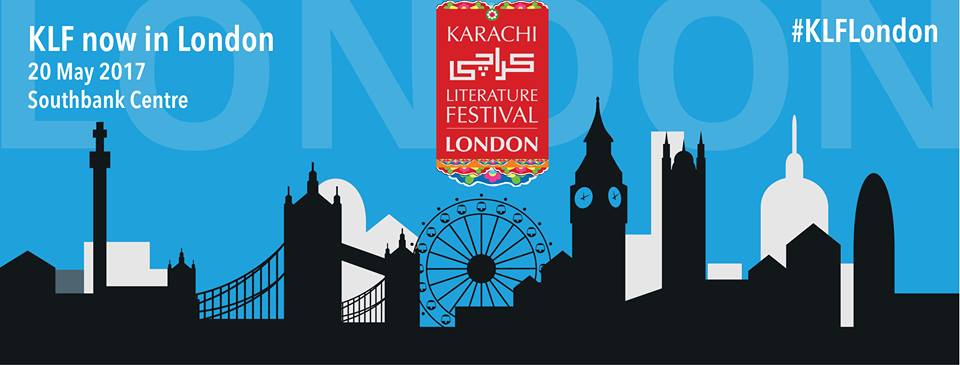
London, 20 May: Celebrating contemporary Pakistan and its rich history and culture in the context of the 70th anniversary of the country’s foundation, the Karachi Literature Festival (KLF) held at the Royal Festival Hall of the Southbank Centre, as a part of their annual festival Alchemy, was a resounding success. Dubbed as Pakistan’s biggest literary event, the KLF brought together writers, scholars, and artists from diverse backgrounds, creative traditions, and academic disciplines to showcase contemporary Pakistani literature and writers. Produced by Oxford University Press (OUP) Pakistan, KLF was organised in collaboration with the Southbank Centre, Bloomsbury Pakistan (a research collective based in London), and Rukhsana Ahmed.
The audiences at the KLF were treated to a medley of around 20 parallel sessions encompassing talks, panel discussions, poetry readings, mushaira, and performances. A stellar cast of around 70 leading Pakistani-origin and international writers, scholars, critics, journalists, and artists participated in stimulating sessions covering a broad range of themes, ideas, and subjects pertaining to Pakistan’s literature, arts, and culture. A separate strand for children which included an immersive theatre piece by Jungly Jadoogars; an animated film by the artist Fauzia Minallah; storytelling by the children’s author, Shahbano Bilgrami; and sing-along songs by the veteran Pakistani musician, Khaled Anam, were also a part of the festival.
KLF London started off with the renowned novelist and journalist, Mohammed Hanif’s keynote address giving unique insights into Pakistan’s history, hopes, and dilemmas. Earlier, at the festival opening, Ameena Saiyid, KLF and Islamabad Literature Festival Founder and Director, Asif Farrukhi, KLF and Islamabad Literature Festival Founder, and Adrian Mellor, Managing Director, Asia Education, OUP, welcomed the guests and speakers. Pakistan’s High Commissioner to UK, Syed Ibn Abbas also spoke on the occasion.
Some of the sessions held early on in the day included ‘Transphobia and Misogyny’, a discussion on legislations around transgenders and women in Pakistan; ‘Reluctant Returners: Migrants, Refugees and Memories of the Homeland’ in which Kamila Shamsie, Qaisra Shahraz, and Mirza Waheed explored characters and fictions inspired by exile and displacement; and ‘Pakistani Renaissance? The Best in Cinema, Reportage, Theatre and Fashion’ with the television actor Atiqa Odho, filmmaker Faris Kermani, designer Maheen Khan, and journalist Cyril Almeida as speakers.
Taimur Rahman, Moni Mohsin, and H. M. Naqvi weighed up the challenge of portraying Pakistan’s gender and class divide in the session ‘Blaming the Elite: Class, Greed, and Gender in Contemporary Pakistan’. Educationists, entrepreneurs, and experts including Farid Panjwani, Ahmereen Reza, Mona Kasuri, and Ameena Saiyid were part of a stimulating panel discussion titled ‘Madrassas and Montessoris: Are Private Schools Keeping Madrassas at Bay?’ moderated by Nigham Shahid.
|
|
In a panel discussion titled ‘Against All Odds: The Price of Prosperity in Pakistan Today’ held later in the day, Shuja Nawaz, Maleeha Lodhi, Ishrat Husain, and Victoria Schofield analyzed geopolitical and internal challenges facing Pakistan. In the session ‘Urdu ki Zid Mai: At Loggerheads: Urdu vs English vs Regional Languages’ Basir Kazmi, Ishrat Afreen, and Harris Khalique, and Asif Farrukhi discussed if Urdu in Pakistan is under threat from English or the regional languages.
The evening sessions comprised thought-provoking discourses on ‘Good Muslim, Bad Muslim: Diaspora Pakistanis Caught in Post Brexit Hate-Storm’, with Ziauddin Sardar, Farooq Bajwa, and Iftikhar Malik debating the challenges faced by Pakistani diaspora in Europe; ‘Karachi: City of Lights and Gangs’ with Laurent Gayer, Nichola Khan, Mohammed Hanif, Sobia Ahmad Kaker, Omar Shahid Hamid, and Kamran Asdar Ali talking about the battle for Karachi and its resilience despite political conflicts; and ‘Tweeting for Social Change: How Social Media is Influencing the Political Scene’ in which Huma Yusuf, Umber Khairi, and Umair Javed discussed the impact of social media on Pakistan’s political scene.
The highlight of the festival was the ‘Satrangi Mushaira’, which was an open mic session for Pakistan’s regional language poets to recite their latest offerings. Another session ‘In Their Own Words: Writers and Poets from Pakistan’, moderated by Muneeza Shamsie, featured poetry and prose readings by writers of Pakistani origin including Imtiaz Dharker, Aamer Hussein, and Zaffar Kunial. In ‘Partition Stories’ Nimra Bucha, Vayu Naidu, Shayma Saiyid, Amrit Kaur Lohia, and Sarah Ansari presented a medley of readings, film clips, recitals, dance and poetry about the Partition of India.
The evening came to a close by a kathak dance performance by Shayma Saiyid and a music concert by Khumariyaan, a Peshawar-based music band known for their fusion brand of Pashtun folk music.
Sponsorship support to the KLF London was provided by Bestway, Arts Council England, Third World Quarterly magazine, Salt n Pepper restaurant, High Commission of Pakistan in London, South Asia Institute of the University of Texas at Austin, and The Pakistan Society.



